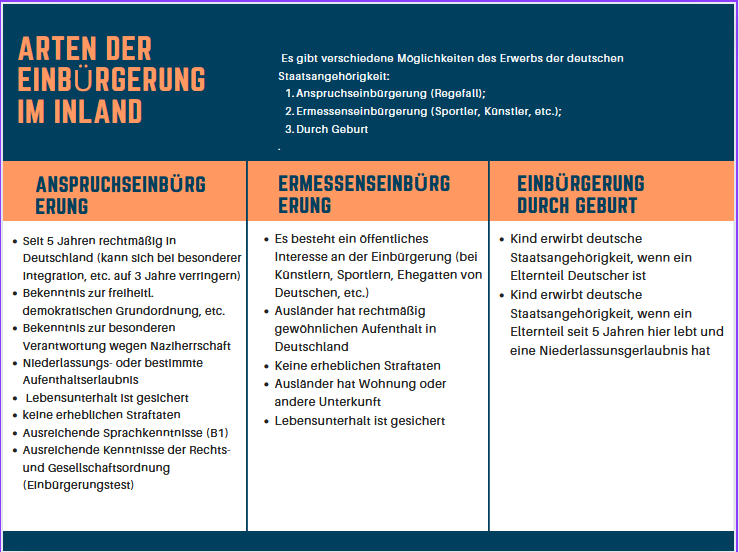Administrative Court of Munich, July 6, 2016, Case No. M 25 K 15.4690
According to § 8 of the Nationality Act (StAG), a foreign national who lawfully resides in Germany can be naturalized upon request if they are legally capable according to § 37 Abs. 1 S. 1 StAG or are legally represented, have not been convicted of a criminal offense, and have not been subjected to measures of rehabilitation or security due to their legal incapacity. They must have secured their own accommodation and be able to support themselves and their dependents. These requirements may be waived for reasons of public interest or to avoid severe hardship.
The authority has discretion regarding naturalization decisions. A decision is binding only if the discretion is reduced to zero, meaning that only one decision is legally possible. The court can only review the authority’s decision for errors in the exercise of discretion.
The following judgement deals with the question of whether the plaintiff is entitled to naturalisation in accordance with Section 8 (1) StAG, in particular with regard to the public interest and particular hardship.
Background of the Case – Denial of Naturalization
The plaintiff, born in 1948 and stateless, applied for naturalization in Germany. His parents had been forcibly relocated from Poland to Germany for forced labor in 1940/1941. In 1993, the plaintiff changed his birth and family name as part of an adoption process. He first applied for naturalization in 1998, which was denied on November 18, 2005, due to a conviction resulting in a total prison sentence of one year and ten months, suspended. A discretionary naturalization under § 8 StAG was also denied on June 30, 2006, for the same reasons. The attempt to challenge this decision in court was unsuccessful, with a final ruling by the Bavarian Administrative Court Munich on February 26, 2007.
Criminal Convictions of the Plaintiff
In July 2008, the plaintiff was convicted again, this time to a fine of 10 daily rates of €30 each for theft. Due to this and previous convictions, the naturalization authority rejected his new application dated May 5, 2015. The rejection, issued on October 6, 2015, cited § 8 Abs. 1 Nr. 2 StAG in conjunction with § 12a Abs. 1 Sentence 3 StAG, which prohibits naturalization if convictions exceed a minor threshold. The decision noted that neither a waiver of the requirement of a clean criminal record for reasons of public interest nor to avoid severe hardship was applicable. The public interest in upholding the legal order outweighed the plaintiff’s personal circumstances.
Plaintiff’s Lawsuit and Request for Interim Relief
The plaintiff filed a lawsuit against the rejection notice before the Munich Administrative Court. He requested that the court either mandate the authority to grant naturalization or, alternatively, to make a new decision in accordance with the court’s guidance. The plaintiff highlighted his difficult family history, including the murder of his paternal grandfather and the disappearance of his paternal grandmother. His maternal grandparents were also murdered in 1944, and his parents were forcibly relocated for labor. He argued that these personal circumstances, combined with the humanitarian consideration under Article 34 of the Geneva Refugee Convention (GFC), warranted his naturalization.
Decision of the Munich Administrative Court
The Munich Administrative Court dismissed the plaintiff’s claim as unfounded. The court found that the authority’s decision was lawful and did not infringe on the plaintiff’s rights. The plaintiff did not have a claim to naturalization under § 8 StAG or § 9 StAG. A claim under § 9 StAG was excluded because the plaintiff was neither the spouse nor the partner of a German citizen. A discretionary naturalization under § 8 Abs. 1 StAG was also excluded, as the legal requirements were not met and the discretion had not been reduced to zero. The plaintiff’s criminal convictions were deemed a significant obstacle to naturalization.
Significance of Criminal Convictions
The court emphasized that the plaintiff’s naturalization was hindered by his criminal convictions. According to § 8 Abs. 1 Nr. 1 StAG, only individuals not convicted of a criminal offense can be naturalized. § 12a Abs. 1 StAG requires summing up multiple convictions. The plaintiff’s convictions, totaling one year, ten months, and ten days, significantly exceeded the minor threshold. As long as these convictions remain in the Federal Central Criminal Register, naturalization is out of question. The cancellation period for these entries was noted to be until July 29, 2018. The naturalization authority is bound by these entries and their cancellation periods, thus the conditions for naturalization were not met.
No Public Interest or Special Hardship
The court also saw no grounds to waive the requirement of a clean criminal record under § 8 Abs. 2 StAG. No public interest justifying naturalization despite the criminal convictions was present. The humanitarian considerations under Article 34 GFC and the plaintiff’s status as a stateless person did not create a specific state interest warranting an exception from the requirement of a clean criminal record. The special status of stateless persons was already adequately addressed by the Stateless Persons Act (HAuslG). Furthermore, no special hardship was found in the plaintiff’s case. Such hardship would need to result from atypical circumstances that the refusal of naturalization would create and that naturalization could mitigate. In this case, no such hardship was identified, as the lack of a clean criminal record existed independently of the naturalization refusal.
The Munich Administrative Court noted that even if discretion were assumed, the authority had properly exercised its discretion. The authority had appropriately considered the plaintiff’s special situation as a stateless person and his long-term residence in Germany. However, the criminal convictions of the plaintiff represented a prevailing public interest, outweighing the plaintiff’s personal interests. Therefore, naturalization was excluded until the expiration of the cancellation period.

Source: Munich Administrative Court
Important Note: The content of this article has been prepared to the best of our knowledge and belief. However, due to the complexity and constant evolution of the subject matter, we must exclude liability and warranty. Important Notice: The content of this article has been created to the best of our knowledge and understanding. However, due to the complexity and constant changes in the subject matter, we must exclude any liability and warranty.
If you need legal advice, please feel free to call us at 0221 - 80187670 or send us an email to info@mth-partner.de
Lawyers in Cologne advise and represent clients nationwide in immigration law.




